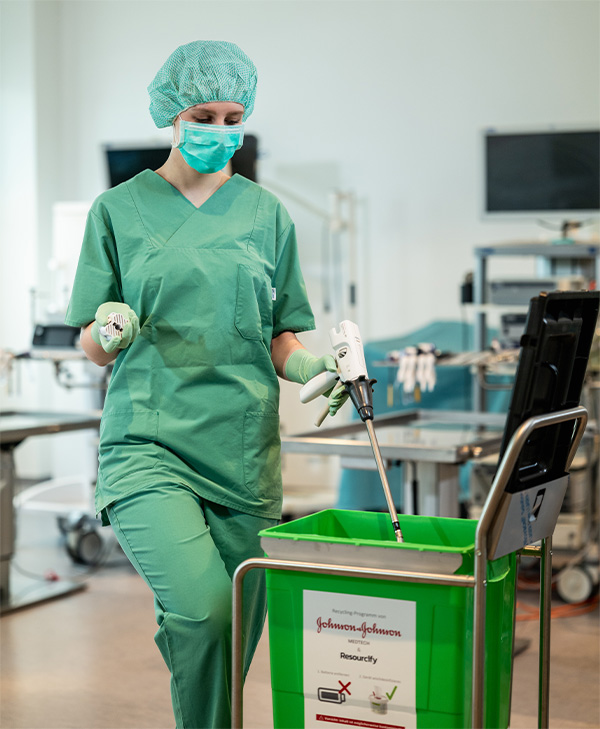We are committed to delivering high-quality products for patients and customers, while also working to improve our environmental footprint. We focus our efforts where we can have a positive impact in the near term and long term, including packaging, product end-of-life and green chemistry.
Improving packaging sustainability
Across our diverse portfolio, we continue to improve the sustainability of our product packaging. For example, in 2023, we:
- continued to expand the use of fiber-based pulp injection molding (PIM) in the secondary packaging of our immunology self-injectable devices. At the end of 2023, approximately 30% of our currently launched self-injectable device product lines used PIM trays. PIM trays can be disposed of through regular cardboard recycling waste streams in most countries;
- launched new Ethicon procedure kits in the EMEA region. This reduced packing weight by 38%, packaging components by 50% and integrated 20% post-consumer recycled (PCR) materials into the carton on average, as compared to previous kits;
- continued to transition eligible J&J MedTech products away from paper Instructions for Use (IFUs) to digital ones. Since 2019, within Ethicon alone, 60 metric tons of paper waste was avoided by not using paper IFUs.
Product end-of-life and circularity
We know that the products we create may continue to have environmental impacts after use, and we strive to offer product end-of-life recycling and circular solutions. In 2023, we expanded several initiatives, including:
- Surgical device recycling: J&J MedTech’s hospital recycling program for single-use medical devices expanded to a total of 11 countries in Europe and New Zealand. The program allows hospitals to recycle specific metal and plastic components from certain J&J MedTech single-use instruments.
- Pharmaceutical device take-back: The Safe Returns program for Innovative Medicine expanded from the U.S. and Switzerland to include Norway, allowing patients to return self-injectable devices. Additionally, we have invested in a new facility in Europe that, when operational, is expected to allow us to disassemble collected devices and recycle select materials.
- Tacking digital health waste: We continued to coordinate the Digital Health in a Circular Economy (DiCE) initiative, a multiyear collaboration of various companies and organizations. In 2023, DiCE developed a comprehensive circularity framework tailored to digital health devices, along with strategies aimed at incentivizing end users to return devices.
- Reprocessing medical devices: J&J MedTech continued to offer reprocessed single-use medical devices in parts of our portfolio in the U.S. and Canada. We also reprocess products from other original manufacturers in these markets.
Green chemistry

We continue to integrate principles of green chemistry and technology into the development of our medicines. For example, we recently adopted biocatalysis in enzymatic processes for two products close to commercialization, helping to reduce the environmental impact of our API manufacturing processes.
Product Lifecycle Assessment (LCA)
Pharmaceutical Environment Group, we collaborated with The Sustainable Markets Initiative Health Systems Task Force and National Health Services (NHS) England to support the development of a sector-wide standard for medicines LCAs.
Pharmaceuticals in the environment (PIE)
We play an important role in supporting initiatives to proactively assess and mitigate potential impact of pharmaceuticals in the environment. We have a mature and robust program for managing PIE. Policies & Positions: Position on Pharmaceuticals in the Environment




